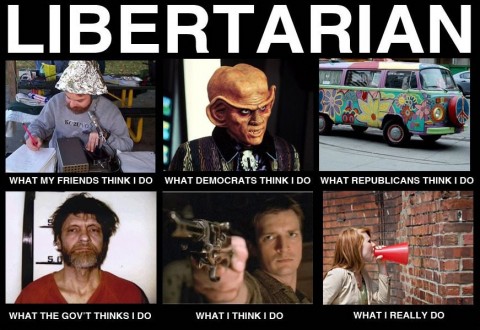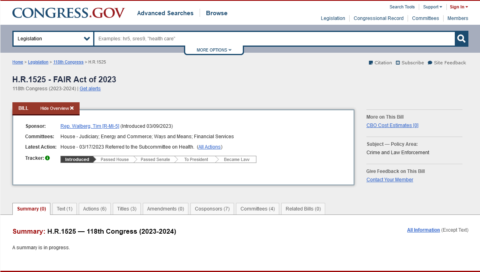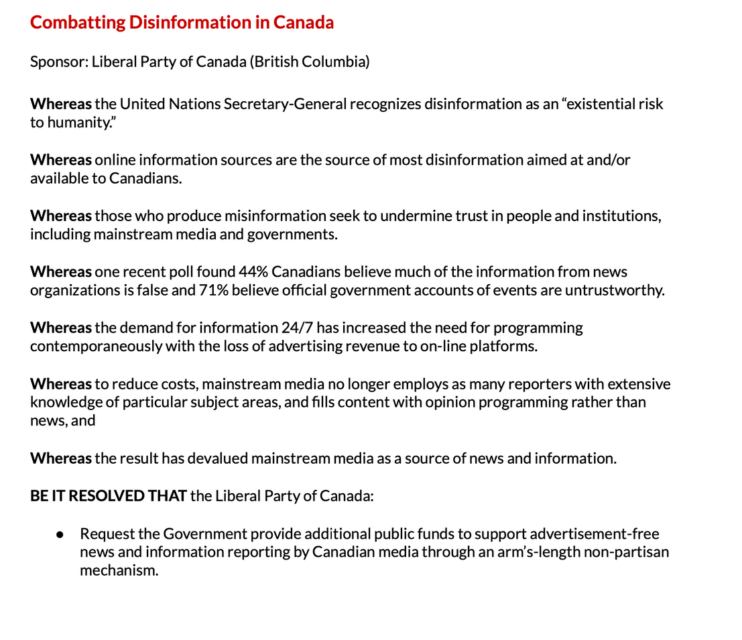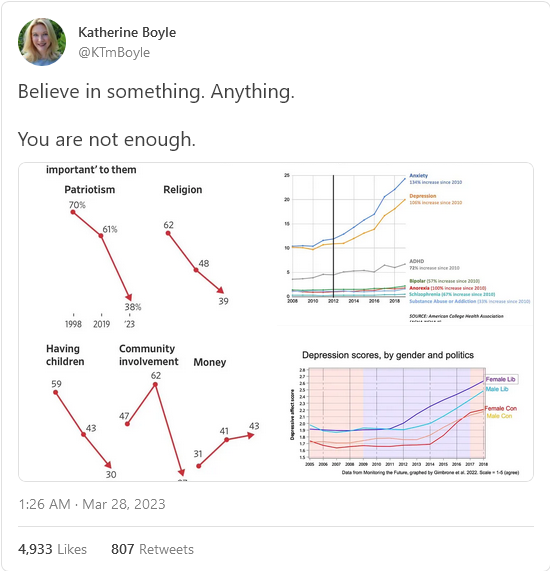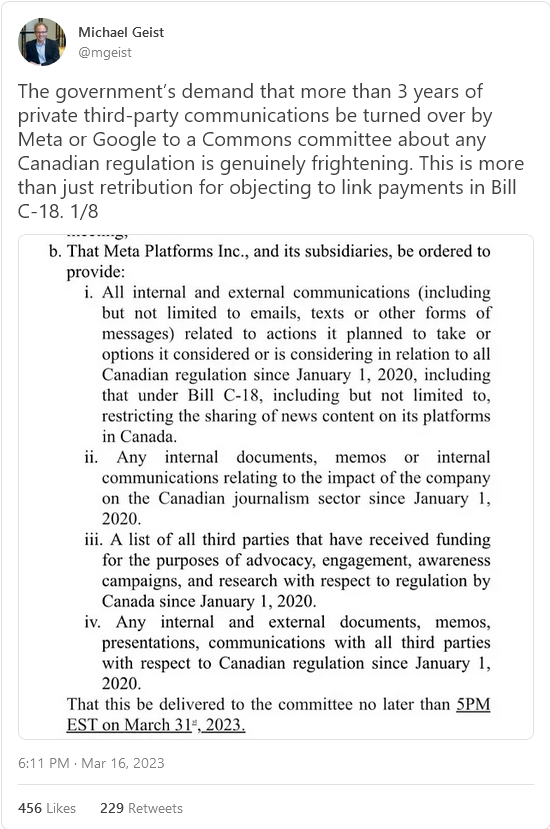The woke world is a world of snitches, informants, rats. Go to any space concerned with social justice and what will you find? Endless surveillance. Everybody is to be judged. Everyone is under suspicion. Everything you say is to be scoured, picked over, analyzed for any possible offense. Everyone’s a detective in the Division of Problematics, and they walk the beat 24/7. You search and search for someone Bad doing Bad Things, finding ways to indict writers and artists and ordinary people for something, anything. That movie that got popular? Give me a few hours and 800 words. I’ll get you your indictments. That’s what liberalism is, now — the search for baddies doing bad things, like little offense archaeologists, digging deeper and deeper to find out who’s Good and who’s Bad. I wonder why people run away from establishment progressivism in droves.
I read about the PWR BTTM accusations. They’re disturbing. I take them seriously. But these guys have had their careers erased overnight, and the idea that we have any responsibility to give them the chance to defend themselves is treated like you took part in their alleged crimes. You simply cannot say, in polite society, “basic fairness requires us to avoid a rush to judgment and to give people the right to respond to accusations”. To do so gets you lumped in with the criminals. Like a friend of mine said, “the only acceptable reaction to an accusation is enthusiastic and unqualified acceptance”. I don’t know how people can simultaneously talk about prison abolition and restoring the idea of forgiveness to literal criminal justice and at the same time turn the entire social world into a kangaroo court system. Like I wrote once, we can’t simultaneously be a movement based on rehabilitation and restorative justice AND a viciously judgmental moral aristocracy. You know who thinks everybody’s guilty until proven innocent? Cops. You know who thinks people don’t deserve the right to defend themselves? Cops. You know who says those who defend basic fairness and due process are as bad as criminals themselves? Cops.
Freddie deBoer, “Planet of Cops”, reposted by Jesse Singal, originally published 2017-05-17.
August 18, 2023
August 9, 2023
QotD: The “Merry Pranksters”
Ken Kesey, graduating college in Oregon with several wrestling championships and a creative writing degree, made a classic mistake: he moved to the San Francisco Bay Area to find himself. He rented a house in Palo Alto (this was the 1950s, when normal people could have houses in Palo Alto) and settled down to write the Great American Novel.
To make ends meet, he got a job as an orderly at the local psych hospital. He also ran across some nice people called “MKULTRA” who offered him extra money to test chemicals for them. As time went by, he found himself more and more disillusioned with the hospital job, finding his employers clueless and abusive. But the MKULTRA job was going great! In particular, one of the chemicals, “LSD”, really helped get his creative juices flowing. He leveraged all of this into his Great American Novel, One Flew Over The Cuckoo’s Nest, and became rich and famous overnight.
He got his hands on some extra LSD and started distributing it among his social scene – a mix of writers, Stanford graduate students, and aimless upper-class twenty-somethings. They all agreed: something interesting was going on here. Word spread. 1960 San Francisco was already heavily enriched for creative people who would go on to shape intellectual history; Kesey’s friend group attracted the creme of this creme. Allan Ginsberg, Hunter S. Thompson, and Wavy Gravy passed through; so did Neil Cassady (“Dean Moriarty”) Jack Keroauc’s muse from On The Road. Kesey hired a local kid and his garage band to play music at his acid parties; thus began the career of Jerry Garcia and the Grateful Dead.
Sometime in the early 1960s, too slow to notice right away, they transitioned from “social circle” to “cult”. Kesey bought a compound in the redwood forests of the Santa Cruz Mountains, an hour’s drive from SF. Beatniks, proto-hippies, and other seekers – especially really attractive women – found their way there and didn’t leave. Kesey and his band, now calling themselves “the Merry Pranksters”, accepted all comers. They passed the days making psychedelic art (realistically: spraypainting redwood trees Day-Glo yellow), and the nights taking LSD in massive group therapy sessions that melted away psychic trauma and the chains of society and revealed the true selves buried beneath (realistically: sitting around in a circle while people said how they felt about each other).
What were Kesey’s teachings? Wrong question – what are anyone’s teachings? What were Jesus’ teachings? If you really want, you can look in the Bible and find some of them, but they’re not important. Any religion’s teachings, enumerated bloodlessly, sound like a laundry list of how many gods there are and what prayers to say. The Merry Pranksters were about Kesey, just like the Apostles were about Jesus. Something about him attracted them, drew them in, passed into them like electricity. When he spoke, you might or might not remember his words, but you remembered that it was important, that Something had passed from him to you, that your life had meaning now. Would you expect a group of several dozen drug-addled intellectuals in a compound in a redwood forest to have some kind of divisions or uncertainty? They didn’t. Whenever something threatened to come up, Kesey would say — the exact right thing — and then everyone would realize they had been wrong to cause trouble.
Scott Alexander, “Book Review: The Electric Kool-Aid Acid Test”, Slate Star Codex, 2019-07-23.
July 10, 2023
QotD: Liberal and conservative views on innovation
Liberals and conservatives don’t just vote for different parties — they are different kinds of people. They differ psychologically in ways that are consistent across geography and culture. For example, liberals measure higher on traits like “openness to new experience” and seek out novelty. Conservatives prefer order and predictability. Their attachment to the status quo is an impediment to the re-ordering of society around new technology. Meanwhile, the technologists of Silicon Valley, while suspicious of government regulation, are still some of the most liberal people in the country. Not all liberals are techno-optimists, but virtually all techno-optimists are liberals.
A debate on the merits of change between these two psychological profiles helps guarantee that change benefits society instead of ruining it. Conservatives act as gatekeepers enforcing quality control on the ideas of progressives, ultimately letting in the good ones (like democracy) and keeping out the bad ones (like Marxism). Conservatives have often been wrong in their opposition to good ideas, but the need to win over a critical mass of them ensures that only the best-supported changes are implemented. Curiously, when the change in question is technological rather than social, this debate process is neutered. Instead, we get “inevitablism” — the insistence that opposition to technological change is illegitimate because it will happen regardless of what we want, as if we were captives of history instead of its shapers.
This attitude is all the more bizarre because it hasn’t always been true. When nuclear technology threatened Armageddon, we did what was necessary to limit it to the best of our ability. It may be that AI or automation causes social Armageddon. No one really knows — but if the pessimists are right, will we still have it in us to respond accordingly? It seems like the command of the optimists to lay back and “trust our history” has the upper hand.
Conservative critics of change have often been comically wrong — just like optimists. That’s ultimately not so interesting, because humans can’t predict the future. More interesting have been the times when the predictions of the critics actually came true. The Luddites were skilled artisans who feared that industrial technology would destroy their way of life and replace their high-status craft with factory drudgery. They were right. Twentieth century moralists feared that the automobile would facilitate dating and casual sex. They were right. They erred not in their predictions, but in their belief that the predicted effects were incompatible with a good society. That requires us to have a debate on the merits — about the meaning of the good life.
Nicholas Phillips, “The Fallacy of Techno-Optimism”, Quillette, 2019-06-06.
July 4, 2023
QotD: The (arguments over the) founding of America
You could of course say that the ideals of universal equality and individual liberty in the Declaration of Independence were belied and contradicted in 1776 by the unconscionable fact of widespread slavery, but that’s very different than saying that the ideals themselves were false. (They were, in fact, the most revolutionary leap forward for human freedom in history.) You could say the ideals, though admirable and true, were not realized fully in fact at the time, and that it took centuries and an insanely bloody civil war to bring about their fruition. But that would be conventional wisdom — or simply the central theme of President Barack Obama’s vision of the arc of justice in the unfolding of the United States.
No, in its ambitious and often excellent 1619 Project, the New York Times wants to do more than that. So it insists that the very ideals were false from the get-go — and tells us this before anything else. Even though those ideals eventually led to the emancipation of slaves and the slow, uneven and incomplete attempt to realize racial equality over the succeeding centuries, they were still “false when they were written”. America was not founded in defense of liberty and equality against monarchy, while hypocritically ignoring the massive question of slavery. It was founded in defense of slavery and white supremacy, which was masked by highfalutin’ rhetoric about universal freedom. That’s the subtext of the entire project, and often, also, the actual text.
Hence the replacing of 1776 (or even 1620 when the pilgrims first showed up) with 1619 as the “true” founding. “True” is a strong word. 1776, the authors imply, is a smoke-screen to distract you from the overwhelming reality of white supremacy as America’s “true” identity. “We may never have revolted against Britain if the founders had not understood that slavery empowered them to do so; nor if they had not believed that independence was required in order to ensure that slavery would continue. It is not incidental that 10 of this nation’s first 12 presidents were enslavers, and some might argue that this nation was founded not as a democracy but as a slavocracy,” Hannah-Jones writes. That’s a nice little displacement there: “some might argue”. In fact, Nikole Hannah-Jones is arguing it, almost every essay in the project assumes it — and the New York Times is emphatically and institutionally endorsing it.
Hence the insistence that everything about America today is related to that same slavocracy — biased medicine, brutal economics, confounding traffic, destructive financial crises, the 2016 election, and even our expanding waistlines! Am I exaggerating? The NYT editorializes: “No aspect of the country that would be formed here has been untouched by the years of slavery that followed … it is finally time to tell our story truthfully”. Finally! All previous accounts of American history have essentially been white lies, the NYT tells us, literally and figuratively. All that rhetoric about liberty, progress, prosperity, toleration was a distraction in order to perpetrate those lies, and make white people feel better about themselves.
Andrew Sullivan, “The New York Times Has Abandoned Liberalism for Activism”, New York, 2019-09-13.
May 30, 2023
Ban all the words!
Chris Bray reflects on the historical context of literature bans:
Before the Civil War, Southern states banned abolitionist literature. That ban meant that postmasters (illegally!) searched the mail, seized anti-slavery tracts, and burned them. And it meant that people caught with abolitionist pamphlets faced the likelihood of arrest. The District of Columbia considered a ban, then didn’t pass the thing, but Reuben Crandall was still arrested and tried for seditious libel in 1833 when he was caught with abolitionist literature. He was acquitted, then died of illness from a brutal pre-trial detention. Seizure, destruction, arrest: abolitionist literature was banned.
The Soviet writer Yevgeny Zamyatin wrote a 1924 novel, We, depicting a world in which an all-powerful government minutely controlled every aspect of life for an enervated population, finding as an endpoint for their ideological project a surgery that destroyed the centers of the brain that allowed ordinary people to have will and imagination. The Soviet government banned Zamyatin’s work: They seized and destroyed all known copies, told editors and publishers the author was no longer to allowed to publish, and sent Zamyatin into exile, where he died without ever seeing his own country again. Seizure, destruction, exile: Yevgeny Zamyatin’s work was banned.
During World War I, the federal government banned literature that discouraged military service, including tracts that criticized conscription. Subsequently, “socialists Charles Schenck and Elizabeth Baer distributed leaflets declaring that the draft violated the Thirteenth Amendment prohibition against involuntary servitude”. They were arrested, convicted, and imprisoned. The Supreme Court upheld the conviction. Anti-conscription literature was banned: It was seized and destroyed, and people caught distributing it were sent to prison.
In 2023, the tedious midwit poet Amanda Gorman posted on Twitter that she was “gutted” — the standard emotion for tedious midwits — to discover that one of her poems had been “banned” by a school in Florida. The news media raced to proclaim that Florida schools are banning books, the leading edge of the Ron DeSantis fascist wave.
As others have already said, Gorman’s boring poem was moved from an elementary school library shelf to a middle school library shelf, without leaving the library
May 27, 2023
Communism, Democracy, Monarchy? Any form of government is inherently tyrannical once it gets big enough
As I’ve mentioned now and again, although I’m philosophically libertarian, I also describe myself as a “weak monarchist” … it’s not that I want a return to spurred-and-booted aristos literally lording it over everyone else, but that the central institution of the monarchy tends to tamp down some of the worst excesses of various flavours of democracy. Presidential systems put a temporary monarch on top, but a temporary monarch with real, day-to-day powers that can be — and often are — exercised to the detriment of some or all of the population. Constitutional monarchy reserves a few rarely used (and rarely needed) powers to the monarch, but delegates the vast majority of the grubby day-to-day governing stuff to grubby elected politicians. This neat division of powers progressively fails as governments attempt to take on more power to interfere in the lives of ordinary people … and that process went into overdrive with the pandemic lockdowns and so much arbitrary power put not into the hands of elected officials (who at least theoretically have to answer to the voters every now and again) but to the already bloated civil service and their extended families of government-funded but “independent” organizations delegated powers to do all sorts of mischief.
All that said, I don’t think I quite fit into Theophilus Chilton‘s group of former-libertarians-turned-monarchists, if only because I’ve always preferred keeping the monarchy in place:
One of the greatest ironies of modern non-mainstream politics in the West is the tendency on the part of libertarians (whose whole ideology supposedly centers upon the maximization of personal freedom) to eventually find their way into supporting much more authoritarian ideologies on the dissident and reactionary Right. Indeed, this is the general route that my own political convictions have taken – from libertarianism to monarchism. Many libertarians would recoil in horror at the thought, yet given the number of former libertarians in neoreaction and in the dissident Right in general, it obviously happens quite often. One of the reasons I would suggest for this is that the foibles and failures of democracy – the governing system most often associated with the libertarian view of freedom – are becoming increasingly apparent to thoughtful observers. The old propaganda used to prop up the democratic dogma in Western nations is becoming increasingly stale and unconvincing. It becomes more and more apparent that democracy does not equal freedom, just as it is becoming apparent that “freedom” is not always and in every sense something that is conducive to good government and stable society.
My purpose with this essay is not to seek to convince my libertarian or classically liberal readers to become monarchists. This may well end up being where they land, politically and ideologically speaking, but their experiences and growth may move them in other directions. What I do want to do is to try to get them started on that path by pointing out that democracy is not any better than other forms of government and may indeed be worse in some areas that we can see empirically. I want to plant a seed of doubt and encourage it to grow. If the thoughtful libertarian is to be convinced, it must be by convincing himself or herself.
Please note that throughout this article, I will refer to “democracy” in a general sense to refer to any modern popular form of government. This includes the sort of representative republican system (formerly) typified by the American government which, while not directly democratic, was still essentially democratic in its overall form and complexion.
Personal Freedom
One of the obvious objections which libertarians and other classical liberals have against monarchy (and other authoritarian governing systems in general) is that the unification of power into the hands of a single executive makes it prone to abuse and to the removal or suppression of the freedoms of the citizenry. Typically, they will envision a monarchy as some kind of police state where citizens who step out of line are severely punished and every aspect of life is closely watched and regulated by the government. This, in turn, leads to a somewhat jaundiced view of history, especially that of the much-excoriated “Dark Ages”, believed to have been a dystopia of violence and tyranny.
This view of the relevant history is, however, untrue and generally relies upon a false epistemic dichotomy that is sadly very common within libertarianism. This is the failure to distinguish between “strong government” and “big government”, the two of which are usually confounded in the classical liberal’s mind. The former term refers to the capacity of the executive to exercise power within his sphere of activity, while the latter describes the extent of the sphere of activity itself. A ruler may be strong in the sense of being decisive and effective in what he does, yet find the area in which he can legitimately act to be circumscribed by law or custom. Among most historical Western monarchies, while kings often ruled “strongly”, they were not able to rule intrusively. Their subjects were often left with a relatively wide degree of latitude in their personal and economic affairs, and the restraints of custom and social structure tended to be more constraining than the actual deeds of their king himself.
Let us contrast this with the various democracies we see in the West, both the United States and others. How much do they really respect personal freedoms? In other words, how much do they really embody the “small government” ideal desired by libertarians and other classical liberals? The answer is: not much at all. Western man lives in democracies in which he can be arrested for tweeting “hate speech” on social media. His everyday life is overseen, administered, and commandeered by a body of regulations enforced by entirely unaccountable bureaucrats who have the capacity to trap him into Kafkaesque nightmares of life-altering tribulation. Every aspect of his food, his clothing, his home, his transportation, his workplace – all controlled by the government he (wrongly) believes he elected freely. If he has any kind of well-paying job or business enterprise, he will be paying a tax rate that ancient absolute monarchs would have blushed to even suggest exacting from their subjects. Democratic governments – supposedly by and for the people – intrude into every area of his life (big government) and do so through robust and often corrupt police state apparatuses which are literally willing to break down his door and possibly shoot him and his family for even minor infractions.
So please, let us dispense with the notion that democracy protects personal freedom.
May 16, 2023
Hope for sensible reform to US Civil Asset Forfeiture?
J.D. Tuccille on the latest bipartisan attempt to at least somewhat rein in the Civil Asset Forfeiture abuse allowed under current rules:
Years after “civil asset forfeiture” became synonymous in many minds with legalized theft, the practice of seizing money and property merely suspected of a connection to a crime remains a boil on the ass of American jurisprudence. Now, in a rare demonstration of cooperation across political divides, Democratic and Republican lawmakers have joined together to introduce legislation to reform the practice of civil forfeiture at the federal level. They are supported by a coalition of organizations that put aside ideological differences in an attempt to curb the dangerous practice. As encouraging as the bill’s prospects appear, that this is not the first attempt to pass this legislation underlines the challenge of correcting government abuses.
“Today, U.S. Representatives Tim Walberg (R-MI) and Jamie Raskin (D-MD) reintroduced the Fifth Amendment Integrity Restoration Act (FAIR Act), a comprehensive reform to our nation’s civil asset forfeiture laws,” the two lawmakers announced in March. “The FAIR Act raises the level of proof necessary for the federal government to seize property, reforms the IRS structuring statute to protect innocent small business owners, and increases transparency and congressional oversight.”
The FAIR Act sets a higher bar for seizing private property, but still allows for civil forfeiture in the absence of a criminal conviction. The legislation requires:
“If the Government’s theory of forfeiture is that the property was used to commit or facilitate the commission of a criminal offense, or was involved in the commission of a criminal offense, the Government shall establish, by clear and convincing evidence, that … there was a substantial connection between the property and the offense; and the owner of any interest in the seized property — (i) used the property with intent to facilitate the offense; or knowingly consented or was willfully blind to the use of the property by another in connection with the offense.”
The bill requires that seizures be conducted in court rather than through administrative processes and also guarantees legal representation for federal forfeiture targets.
The FAIR Act isn’t a perfect bill. Many reformers will object that forfeiture should require the criminal conviction of the person whose money and property is being taken. Draining somebody’s bank account and nabbing their car keys may not be as dramatic as throwing them in a prison cell, but it’s a harsh punishment all the same and should require full due process. Still, some improvement is better than none for a practice that has largely served as an exercise in legalized highway robbery.
May 15, 2023
Paul Wells – “Unworkable and swiftly-disavowed tinpot dictatorship is, statistically, one of the least damaging forms of tinpot dictatorship”
Paul Wells follows up last week’s rather disturbing report that the Liberal Party’s big gathering in Ottawa extruded a resolution to get “The Government” to work toward forcing journalists (and those peasant bloggers like Paul Wells) to only publish things that the sources informing it could be “traced” by that same authority:
Last Friday I wrote about a policy resolution at the big Liberal Party of Canada national convention that was, in my opinion, bad. This was the resolution that would have the party “request the government explore options” to “hold on-line information sources accountable” by requiring that they “limit publication only to material whose sources can be traced”.
How do you limit publication to traceable sources? I have to assume you clear the sources. “This resolution has no meaning,” wrote I, “unless it means I would be required to clear my posts through the federal government, before publication, so the ‘traceability’ of my sources could be verified.”
Some people disagreed, but I had a hard time getting them to describe what it could mean if it wasn’t what I thought. I was careful to note that party conventions aren’t binding on governments. Commenters sympathetic to the Trudeau government latched onto all the this-might-mean-nothing language, the stuff about “request” and “explore options.” At their convention, a tiny minority of registered Liberal delegates attended a “policy workshop” at which nothing was debated. Amid considerable confusion about where these resolutions were in the party’s own process — Althia Raj covered it on Twitter; go look if you like — this resolution became party policy with no discussion at all. That was on Saturday.
On Tuesday, Justin Trudeau went before reporters and said no Liberal government would ever implement this Liberal policy. Other cabinet ministers followed suit, and one MP who didn’t benefit from the counsel of the Monday-morning issues-management call had a rougher time executing the U-turn.
Look, I think the amount of self-inflicted ballistic damage to the government’s own foot here is minor. Unworkable and swiftly-disavowed tinpot dictatorship is, statistically, one of the least damaging forms of tinpot dictatorship.
But I want to let everyone in on a secret of my journalism, and indeed of most journalism: Criticism of politicians is often advice to politicians. I actually don’t spend a lot of time hoping governments and opposition parties will keep pursuing self-destructive and country-destructive choices indefinitely. I always hope a bit of mockery, especially pre-emptive mockery, will help inform their choices. If it stings when Wells writes it, it might sting worse when everyone is saying it.
Ministers of the Crown who didn’t need to wait for the Monday-morning issues-management meeting to tell them what to think could have spent the weekend thinking for themselves. They might even have invited their own staffs, riding executives, and Liberals at large to think for themselves. A dozen or so hardy souls, out of 3,500 registered delegates, might then have showed up to the policy workshop willing to debate.
“Uh, Paragraph Two looks hinky. How would a government enforce that?”
“Well, it doesn’t apply to reputable journalists.”
“Great, thanks. Remind me who decides who’s reputable? Any thought on who’ll be making those calls once we’re no longer in government?”
Maybe somebody would have added a friendly amendment. “For greater clarity, nothing in this paragraph impinges …”
I can even imagine a cabinet minister showing up for those floor debates and influencing the party’s direction single-handed. I’ve seen it happen in other parties. But I had Liberal friends over the weekend explain to me that no such thing ever happens. Fine, it’s your funeral. Basically we’re watching a party choose between two different models of public-policy deliberation:
OPTION 1: Smart people think and talk.
OPTION 2: Everybody in the party defends rickety thinking until it blows up in their faces.
I’m not kidding when I tell you most people in political communications would defend Option 2. We’re living in a time that values message over thinking. But folks can’t say I didn’t warn them.
May 10, 2023
From Thomas Szasz to Jordan Neely – how noble ideals can lead to terrible results
At Samizdata, Natalie Solent remembers how her early discovery of Ideology and Insanity by Thomas Szasz helped to shape her philosophical views in a generally libertarian direction. On the other hand, as the death of Jordan Neely shows, one of the long-term results of Szasz’s denunciation of the institutionalization of the mentally ill has been a vast increase in violence, vandalism, and anti-social behaviour in urban areas:
Szasz believed that if we accept that “mental illness” is a euphemism for behaviors that are disapproved of, then the state has no right to force psychiatric “treatment” on these individuals
Great stuff. I think Szasz still has much to teach us… but I suppose by now you have all heard of the killing of Jordan Neely on a New York subway train?
I have linked to the Wikipedia account for convenience, but I do not trust Wikipedia. There are very few media outlets I do trust on subjects like this. The magazine USA Today initially called Neely a “beloved subway performer”. USA Today has changed the article since, but I saw it when it still had the original wording. The article was right to say that Jordan Neely was a human being with a tragic past, but he was not beloved by users of the New York subway. Back in 2013, a Reddit post on /r/nyc warned passengers, “Try to stay away from the Michael Jackson impersonator if you see him … Just avoid the guy at all costs, try not to look at him at all. Stay safe.” That was Neely. By the time of his death, he had been arrested more than forty times, including for crimes of violence.
There are thousands of Americans like Neely who still live as he lived, exercising the right Thomas Szasz helped gain them to be mentally ill (or whatever you want to call it) drug addicts living on the subways and roadside verges of America. It is not going well for them or for others. A viral graph shows the declining proportion of Americans held in mental hospitals and the rising proportion of Americans held in prisons forming a neat “X” over the course of the twentieth century. Liberals in the U.S. sense have a prodigious capacity to not see inconvenient facts, but even they are being forced to notice that the presence of the crazies and junkies is causing their beloved public spaces and public facilities to become dirty, frightening places to which much of the public only goes when it must.
There is a libertarian solution of course: fewer public spaces. This would increase, not decrease, the number of places where the public could happily go. Junkies and crazies are much less of a problem in shopping malls, because the owners still retain some power to eject them. I feel no shame in saying that a further benefit would be that said junkies and crazies would be under more pressure to seek treatment if the state no longer facilitated them sleeping on the sidewalks and the subway trains.
Unfortunately for everyone, this solution is politically impossible in the current climate. Even in the miraculous event that the public transport systems and the streets of New York, San Francisco and Chicago were privatised tomorrow, anti-discrimination law would ensure that practically no one could be excluded.
Thomas Szasz had a noble ideal. Sadly, the way it combined with the dominant ideals of our time has produced very bad results. I know what should and could be done to make things better in a sane society, but the US in 2023 is not that society. So what can be done?
May 6, 2023
The federal Liberals want even more control over the internet
Paul Wells notes that a policy proposal at the Liberal conference this week indicates just how much the Liberal Party of Canada wants to control free expression on the internet:
Here on the 2023 Liberal convention’s “Open Policy Process” page are links to “Top 20 Resolutions” and “Fast-Tracked Resolutions”. The latter go straight to the plenary floor, the former go through a smaller preliminary debate and, if they pass, then on to the plenary. These things move fast because, in most cases, Liberals are paying only listless attention to the discussions. Policy is for New Democrats. Well, I mean, it used to be.
But sometimes words have meaning, so this morning I’m passing on one of the Top 20 Resolutions, from pages 12 and 13 of that book. This one comes to us from the British Columbia wing of the party.
It’s in two screenshots simply because it spreads across two pages. This is the entire resolution.
BC Liberals want “on-line information services” held “accountable for the veracity of material published on their platforms” by “the Government”. The Government would, in turn, “limit publication only to material whose sources can be traced”.
This resolution has no meaning unless it means I would be required to clear my posts through the federal government, before publication, so the “traceability” of my sources could be verified. I don’t suppose this clearance process would take too much more time than getting a passport or a response to an access-to-information request. Probably only a few months, at first. Per article.
After publication, “the Government” would hold me accountable for the veracity of my material, presumably through some new mechanism beyond existing libel law.
I’m not sure what “the Government” — I’m tickled by the way it’s capitalized, like Big Brother — would have made of this post, in which I quote an unnamed senior government official who was parked in front of reporters by “the Government” on the condition that he or she or they not be named. But by the plain meaning of this resolution, I would not have to wonder for long because that post would have been passed or cleared by the Government’s censors before publication, and I’m out of recourse if that process simply took longer than I might like.
May 5, 2023
April 11, 2023
QotD: Being the target of a death threat
It is now about fourteen months since, after receiving my second death threat, I started carrying a firearm almost constantly. This experience has taught me a few truths, some merely amusing but others with larger implications.
[…]
And about that security plan: carrying a firearm is nearly useless without very specific kinds of mental preparation. It’s not just that you have to think through large ethical issues about when to draw and when to fire (equivalently, when to threaten lethal force and when to use it). You also need good defensive habits of mind. Carrying a firearm is no good if an adversary wins the engagement before you have time to draw.
The most basic good habit of mind is maintaining awareness of your tactical environment. From what directions could you be attacked? Is there a way for an assailant to come up behind you for a hand-to-hand assault, or to line up a shooting position from beyond hand-to-hand range where you couldn’t see it? Are you exposed through nearby windows?
One advantage I had going in was reading Robert Heinlein as a child. This meant I soaked up some basic tactical doctrine through my pores. Like: when you go to a restaurant, sit with your back to a wall, preferably in a corner, in a place with good sightlines but not near a window. When you sit down, think about possible threat axes and which direction to bail out in if you have to.
Advice I’ve gotten from people with counterterrorism training includes this lesson: watch your environment and trust your instincts. Terrorists, criminals, and crazies don’t tend to blend in well even when they’re trying. If someone nearby looks or feels out of place in your surroundings, or behaves in a way not appropriate to the setting, pay attention to that; check your escape routes and make sure you can reach your weapons quickly.
How careful you have to be depends on the threat model you’re planning against. I’m not going to talk about mine in detail, because that might compromise my security by telling bad guys what expectations to game against. But I will say that it assigns a vanishingly small probability to professionals with scoped rifles; the background culture of both Iranian terrorists and their Arab proxies makes it extremely difficult for them to train or recruit snipers, and I am reliably informed that the Iranians couldn’t run professional hit teams in the U.S. anyway – too difficult to exfiltrate them, among other problems.
This, along with some other aspects of the threat model I won’t discuss, narrows the range of plausible threats to something an armed and trained individual with good backup from law enforcement has a reasonable hope to be able to counter. And the good backup from law enforcement is not a trivial detail; real life is not a Soldier of Fortune story or a running-man thriller, and a sane security plan uses all the resources available from your connections to the society around you.
Eric S. Raymond, “Fourteen months of carrying”, Armed and Dangerous, 2010-09-21.
April 10, 2023
1970: Welcome to SEALAND | Nationwide | Voice of the People | BBC Archive
BBC Archive
Published 18 Dec 2022Nationwide‘s Bob Wellings is winched up to meet the Bates, the first family of the Principality of Sealand.
Formerly HM Fort Roughs, Sealand is a concrete and iron platform in the North Sea about seven miles off the Suffolk coast. What has drawn the family to this remote place? How does living in such an unusual environment effect their day-to-day life? What are their plans for it?
Originally broadcast 19 March, 1970.
(more…)
April 8, 2023
“The evidences of history and human nature are very clear: the Enlightenment was a tremendously bad idea”
Theophilus Chilton tries to persuade conservatives and libertarians that Classical Liberalism has failed:
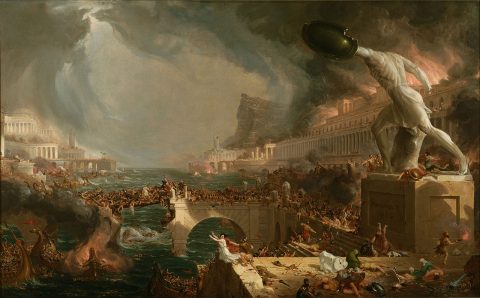
The Course of Empire – Destruction by Thomas Cole, 1836.
From the New York Historical Society collection via Wikimedia Commons.
The premise for this article might seem surprising to many who are used to believing that the Fukuyaman “end of history”, with its proposed ultimate victory of liberal democracy and market capitalism, is a done deal. After all, we look around the world and see the spread of democracy (even if by military force) taking place, as well as seeing the world seemingly integrated into a global economy characterized by complete fungibility of capital, resources, and labour. Yet, while this may be the façade which we are presented, it is manifestly obvious that most of what is called “democracy” is a sham and most of what is called “capitalism” is merely a cover for cronyism at the highest levels. This is the case even in the United States. We can no longer call our system “liberal” in any sort of classical sense when you can be jailed for referring to someone with the “wrong” pronoun and where the supposedly “free” press is effectively only the propaganda arm of one political party.
All over the world, classical liberalism is being supplanted by socialism and progressivism. This is obvious. What is even more obvious is that classical liberalism has been completely unable to prevent this from occurring. While there are some places where the tide is at least being slowed, this is due to the efforts of nationalists and others calling for stronger government along reactionary and traditional lines, not by those advocating for Reaganism, Thatcherism, or other manifestations of modern classical liberalism. Indeed, the two primary expressions of modern classical liberalism – libertarianism and American-style conservatism – are basically failures in every way. Libertarianism has devolved into a clown show of competing virtue signals, while conservatism (which has yet to actually conserve anything) has fastened onto itself the straitjacket of ideological dogmatism dictated to it by neo-conservatives and K-Street lobbyists.
We should not be surprised, however, that this has been the case. Classical liberalism itself was doomed from its inception. The reason for this is that classical liberalism derived directly from the sort of shoddy and shallow philosophies that drove the so-called “Enlightenment”. The Enlightenment – which we were all told was a good thing by our publik skoolz – represented a marked departure by Western civilisation from traditional realities upon which successful Western cultures were built. In contrast to the traditional values of the West, Enlightenment values represented a very skewed, unrealistic form of wishful thinking. Once these departures began to be codified into practice at the national level, it was only a matter of time before the leftward drift affected even the most morally well-insulated nations.
Below, I would like to discuss four basic areas where classical liberalism as an Enlightenment philosophy was set up for failure from the beginning.
On a somewhat less polemic level, Andrew Potter wonders if the sense of civilizational decline and dissolution many of us are feeling is down to the lack of community:
Here are some charts that were going around the social media the other day:
Boyle — a partner at Andreessen Horowitz — paired these charts with links to a series of reports and studies connecting these declines to a clutch of modern day problems, in particular rising levels of anxiety and depression, despair, most notably amongst the young.
As the boomers used to say, you don’t need a weatherman to know which way the wind is blowing. The Western world is in a bit of a funk.
Our political systems have become impossibly polarized, our economies stagger from one crisis to the next, and the welfare state is bumping up against the limits imposed by escalating costs and diminishing state capacity. All of this comes as people are losing faith in the institutions that have served for decades as the building blocks of a cohesive society. Our reserves of social capital are depleted as numerous countries report falling levels of patriotism, religiosity, and community-mindedness. Everyone’s more or less given up on having kids, while close to a third of men aged 18-30 haven’t had sex in the past year.
These stats vary from country to country, and some places are obviously doing better than others. But the trends are grim across the board; there’s no question that, in general, people in the West are in a bad way. The debate revolves around the cause or causes of these phenomena. Is it social media? The pandemic? Housing prices, debt and precarious employment?
One possibility is that the problem lies with the modern world itself. That the basket of rights-based political individualism and consumer-driven economic capitalism might provide us with all manner of creature comforts and technological wonders, but it doesn’t give us meaning. At the dark heart of liberalism lies nihilism.
This is not a new charge, it has been around as long as there has been liberalism. Yet there’s a bit of disagreement over exactly where the problem lies. For some, from Dostoevsky to the existentialists, the worry was deeply metaphysical: that in the absence of a god, or some comparable external source of absolute morality, the only alternative is raw moral relativism.
For other critics, the complaint is more aesthetic. The consumer goods and individualistic values that liberalism promotes are seen as terribly shallow and narcissistic, with the vulgar virtues of television and cheeseburgers supplanting the higher arts of opera and the terroir.
But there’s another argument, that sort of splits the difference between the metaphysical and the aesthetic worries. This is the idea that for all its promotion of radical pluralism, liberalism is actually hostile to true difference and diversity, of the sort that permits the flourishing of distinct communities. This was the central complaint of the Canadian philosopher George Grant, whose anti-American nationalism was based not on any sense that Canada was intrinsically worthwhile, but that its more collective approach to public life would foster a communitarianism that was not possible in the United States.
March 20, 2023
“It amounts to nothing less than a declaration of all-out war between the government and the Big Tech companies”
The editors of The Line have strong opinions on the federal government’s decision to batter Google, Facebook, and other online “giants” over their opposition to the proposed internet legislation in bills C-11 and C-18:
As a result of C-18, both Google and Meta have considered dropping news distribution from their platforms, or have outright promised to do so. To which we have responded: “Well, no shit, Sherlocks.” We have, in fact, warned all of the parties involved with this misguided bill that that’s exactly what was going to happen.
Nonetheless, the dim-witted government officials and corporate media barons who have pinned their hopes of survival to the apparent money spigot of Big Tech didn’t believe us. So when Meta came right out and said it would drop news last week, the ashen-faced Minister of Heritage accused them of using “intimidation and subversion” tactics. And, thus, these demands for private correspondence appear to have been drafted.
It amounts to nothing less than a declaration of all-out war between the government and the Big Tech companies — and, by extension, the many independent media creators like ourselves.
Well. Okey Dokey then.
*cracks knuckles*
Let’s start with two very obvious points: firstly, we at The Line don’t object to forcing these tech companies to disclose funding to third parties for the purpose of opposing C-18 et al. That is perfectly reasonable, in our minds. Further, if these companies are being accused of anything illegal, by all means, investigate away — after you get a warrant.
The rest of these demands are nothing short of banana crackers; it’s an extraordinary interpretation of the committee’s mandate. It’s the kind of overbroad dragnet that will necessarily create privacy breaches for the unknown numbers of ordinary citizens, dissidents and journalists who have corresponded with these companies about these bills.
We will remind the government that private citizens and private companies do not owe the government a full accounting of their private business or communications. The government is subject to this kind of transparency and disclosure because the government works for us. Not the other way around.
We will also point out the irony. The government is demanding years worth of correspondence from private entities within a very short time frame: this is a level of transparency that no government department would subject itself to. Don’t believe us? Just try to draft a similar ATIP request to any ministry; it would take years to get such a request fulfilled, and half if it would come back redacted.


